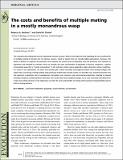The costs and benefits of multiple mating in a mostly monandrous wasp
Date
04/2015Metadata
Show full item recordAbstract
The taxonomically widespread nature of polyandry remains a puzzle. Much of the empirical work regarding the costs and benefits of multiple mating to females has, for obvious reasons, relied on species that are already highly polyandrous. However, this makes it difficult to separate the processes that maintain the current level of polyandry from the processes that facilitate its expression and initiated its evolution. Here we consider the costs and benefits of polyandry in Nasonia vitripennis, a species of parasitoid wasp that is “mostly monandrous” in the wild, but which evolves polyandry under laboratory culture conditions. In a series of six experiments, we show that females gain a direct fecundity and longevity benefit from mating multiply with virgin males. Conversely, mating multiply with previously mated males actually results in a fecundity cost. Sexual harassment may also represent a significant cost of reproduction. Harassment was, however, only costly during oviposition, resulting in reduced fecundity, longevity and disrupted sex allocation. Our results show that ecological changes, in our case associated with differences in the local mating structure in the laboratory can alter the costs and benefits of mating and harassment and potentially lead to shifts in mating patterns.
Citation
Boulton , R & Shuker , D M 2015 , ' The costs and benefits of multiple mating in a mostly monandrous wasp ' , Evolution , vol. 69 , no. 4 , pp. 939-949 . https://doi.org/10.1111/evo.12636
Publication
Evolution
Status
Peer reviewed
ISSN
0014-3820Type
Journal article
Description
Funding: NERC DTGCollections
Items in the St Andrews Research Repository are protected by copyright, with all rights reserved, unless otherwise indicated.

